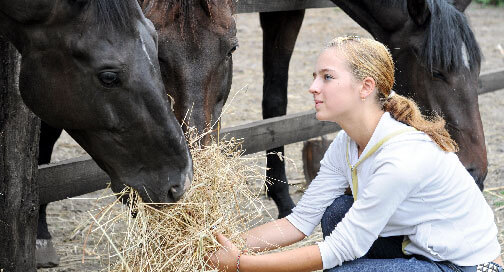When you’ve decided it is time to take action and enroll your daughter in a girls ranch for troubled youth, you may be focused on her need for therapy to get to the root of her issues. However, in addition to the professional therapeutic treatment she will get, there are plenty of real world lessons that your daughter will learn.
So what are the real world lessons learned at a girls ranch for troubled youth? Here are a list of 3 life lessons that troubled teenage girls can learn at a girls ranch.
Life Lesson #1: Learn How to Work Through Conflict
Many children learn to deflect attention from a confrontational situation and never learn to work through it. Some kids turn to violence, destructive behavior or other negative actions to avoid the real issues. Conflict is a fact of life, and when teens don’t learn how to negotiate conflict, they are stuck without the necessary tools to move through it and move on. Learning how to work through conflict means recognizing and dealing with emotions, being true to the inner voice and moral compass and apply problem solving skills to find a resolution.
The girls ranch will help your troubled teen girl encounter and resolve conflict in a controlled environment and deal with her emotions in an honest way.
Life Lesson #2. Take Responsibility for Actions
Being a teenager is a time to expand on your independence and learn how to function in the world as a responsible adult. Troubled teens often don’t realize that there are consequences to their actions, and suffer when they make decisions that result in negative results. Children and teenagers who aren’t responsible for their actions and choices will continue to make bad choices.
The girls ranch will help your troubled teen girl make low risk choices that increase in importance as she gains the tools and coping skills to take more responsibility for her own actions and understand how they affect herself and others.
Life Lesson #3. Serve Others
Statistics show that the happiest people spend time doing things for others. Your daughter needs to be given a chance to use her own talents and abilities to help out others. Not only does this practice affect attitudes and turn her outlook from selfish to generous, but it improves her self-esteem and gives her proper perspective about her own circumstances. Serving others is hard for people at any age, but will teach valuable lessons that troubled teenage girls may lack.
The girls ranch will help your teenage girl have opportunities to serve others, whether it is a horse during equine therapy, others in her group home or those who are less fortunate than her, helping her develop empathy and compassion.
If you are wondering what life lessons your troubled teenage girl will be learning at a girls ranch for troubled youth, you can gain peace of mind knowing that the experiences she has will add to her overall health and wellness and better prepare her for transitioning to a successful adult life.











0 Comments